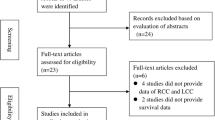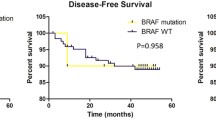Abstract
Introduction
Approximately 40% of colorectal cancers have a KRAS mutation. The prognostic significance of KRAS mutations in patients with non-metastatic colon cancer has not been well elucidated. The National Cancer Database (NCDB) was used to analyze factors associated with KRAS mutation as well as its impact on the presentation and survival of patients with stages I–III colon cancer.
Methods
The NCDB was queried to identify patients diagnosed with stages I–III adenocarcinoma of the colon from 2004 to 2015.
Results
A total of 19,877 patients with known KRAS status were identified: mutation rates were 33% in stage I, 35% in stage II, and 38% in stage III patients (p < 0.01). On multivariable analysis, black race and right-sided location were independently associated with KRAS-mutated cancers (all p < 0.01). On univariate analysis for overall survival (OS), KRAS mutation was not significantly associated with a worse 5-year OS for stages I and II patients (p = 0.60 and 0.88, respectively). However, stage III KRAS-mutated colon cancers had a lower OS as compared with KRAS wild type cancers both on univariate and multivariable analysis. Right-sided colon cancers were independently associated with a worse prognosis compared with left-sided lesions (p < 0.01).
Conclusions
KRAS-mutated colon cancers were more frequently observed in black patients, right-sided locations, and higher-stage tumors. These mutations had a negative prognostic impact for stage III patients, suggesting that the incorporation of genotypic data into colon cancer staging may help to guide systemic therapy and prognostication of colon cancer patients.

Similar content being viewed by others
References
Cancer Genome Atlas N. Comprehensive molecular characterization of human colon and rectal cancer. Nature. 2012;487(7407):330–337.
Eklof V, Wikberg ML, Edin S, et al. The prognostic role of KRAS, BRAF, PIK3CA and PTEN in colorectal cancer. Br J Cancer. 2013;108(10):2153–2163.
Cicenas J, Tamosaitis L, Kvederaviciute K, et al. KRAS, NRAS and BRAF mutations in colorectal cancer and melanoma. Med Oncol. 2017;34(2):26.
Roth AD, Tejpar S, Delorenzi M, et al. Prognostic role of KRAS and BRAF in stage II and III resected colon cancer: results of the translational study on the PETACC-3, EORTC 40993, SAKK 60-00 trial. J Clin Oncol. 2010;28(3):466–474.
Obuch JC, Ahnen DJ. Colorectal Cancer: Genetics is Changing Everything. Gastroenterol Clin North Am. 2016;45(3):459–476.
Puccini A, Berger MD, Zhang W, Lenz HJ. What We Know About Stage II and III Colon Cancer: It’s Still Not Enough. Target Oncol. 2017;12(3):265–275.
Amado RG, Wolf M, Peeters M, et al. Wild-type KRAS is required for panitumumab efficacy in patients with metastatic colorectal cancer. J Clin Oncol. 2008;26(10):1626–1634.
Brudvik KW, Kopetz SE, Li L, Conrad C, Aloia TA, Vauthey JN. Meta-analysis of KRAS mutations and survival after resection of colorectal liver metastases. Br J Surg. 2015;102(10):1175–1183.
Goffredo P, Utria AF, Beck AC, et al. The Prognostic Impact of KRAS Mutation in Patients Having Curative Resection of Synchronous Colorectal Liver Metastases. J Gastrointest Surg. 2018.
Tosi F, Magni E, Amatu A, et al. Effect of KRAS and BRAF Mutations on Survival of Metastatic Colorectal Cancer After Liver Resection: A Systematic Review and Meta-Analysis. Clin Colorectal Cancer. 2017;16(3):e153-e163.
Andreyev HJ, Norman AR, Cunningham D, et al. Kirsten ras mutations in patients with colorectal cancer: the 'RASCAL II' study. Br J Cancer. 2001;85(5):692–696.
Ogino S, Meyerhardt JA, Irahara N, et al. KRAS mutation in stage III colon cancer and clinical outcome following intergroup trial CALGB 89803. Clin Cancer Res. 2009;15(23):7322–7329.
Andreyev HJ, Norman AR, Cunningham D, Oates JR, Clarke PA. Kirsten ras mutations in patients with colorectal cancer: the multicenter “RASCAL” study. J Natl Cancer Inst. 1998;90(9):675–684.
Gavin PG, Colangelo LH, Fumagalli D, et al. Mutation profiling and microsatellite instability in stage II and III colon cancer: an assessment of their prognostic and oxaliplatin predictive value. Clin Cancer Res. 2012;18(23):6531–6541.
Taieb J, Zaanan A, Le Malicot K, et al. Prognostic Effect of BRAF and KRAS Mutations in Patients With Stage III Colon Cancer Treated With Leucovorin, Fluorouracil, and Oxaliplatin With or Without Cetuximab: A Post Hoc Analysis of the PETACC-8 Trial. JAMA Oncol. 2016;2(5):643–653.
Sinicrope FA, Mahoney MR, Smyrk TC, et al. Prognostic impact of deficient DNA mismatch repair in patients with stage III colon cancer from a randomized trial of FOLFOX-based adjuvant chemotherapy. J Clin Oncol. 2013;31(29):3664–3672.
Sinicrope FA, Shi Q. Combining molecular markers with the TNM staging system to improve prognostication in stage II and III colon cancer: are we ready yet? J Natl Cancer Inst. 2012;104(21):1616–1618.
Bacolod MD, Barany F. Molecular profiling of colon tumors: the search for clinically relevant biomarkers of progression, prognosis, therapeutics, and predisposition. Ann Surg Oncol. 2011;18(13):3694–3700.
Network NCC. Colon Cancer (Version 1.2019). 2019; https://www.nccn.org/professionals/physician_gls/pdf/colon.pdf. Accessed April 17, 2019.
Taieb J, Tabernero J, Mini E, et al. Oxaliplatin, fluorouracil, and leucovorin with or without cetuximab in patients with resected stage III colon cancer (PETACC-8): an open-label, randomised phase 3 trial. Lancet Oncol. 2014;15(8):862–873.
Alberts SR, Sargent DJ, Nair S, et al. Effect of oxaliplatin, fluorouracil, and leucovorin with or without cetuximab on survival among patients with resected stage III colon cancer: a randomized trial. JAMA. 2012;307(13):1383–1393.
Taieb J, Le Malicot K, Shi Q, et al. Prognostic Value of BRAF and KRAS Mutations in MSI and MSS Stage III Colon Cancer. J Natl Cancer Inst. 2017;109(5).
Yoon HH, Tougeron D, Shi Q, et al. KRAS codon 12 and 13 mutations in relation to disease-free survival in BRAF-wild-type stage III colon cancers from an adjuvant chemotherapy trial (N0147 alliance). Clin Cancer Res. 2014;20(11):3033–3043.
Imamura Y, Morikawa T, Liao X, et al. Specific mutations in KRAS codons 12 and 13, and patient prognosis in 1075 BRAF wild-type colorectal cancers. Clin Cancer Res. 2012;18(17):4753–4763.
Petrelli F, Tomasello G, Borgonovo K, et al. Prognostic Survival Associated With Left-Sided vs Right-Sided Colon Cancer: A Systematic Review and Meta-analysis. JAMA Oncol. 2017;3(2):211–219.
Gabriel E, Attwood K, Al-Sukhni E, Erwin D, Boland P, Nurkin S. Age-related rates of colorectal cancer and the factors associated with overall survival. J Gastrointest Oncol. 2018;9(1):96–110.
White A, Joseph D, Rim SH, Johnson CJ, Coleman MP, Allemani C. Colon cancer survival in the United States by race and stage (2001-2009): Findings from the CONCORD-2 study. Cancer. 2017;123 Suppl 24:5014–5036.
Valeri L, Chen JT, Garcia-Albeniz X, Krieger N, VanderWeele TJ, Coull BA. The Role of Stage at Diagnosis in Colorectal Cancer Black-White Survival Disparities: A Counterfactual Causal Inference Approach. Cancer Epidemiol Biomarkers Prev. 2016;25(1):83–89.
Winchester DP, Stewart AK, Phillips JL, Ward EE. The national cancer data base: past, present, and future. Ann Surg Oncol. 2010;17(1):4–7.
Author information
Authors and Affiliations
Corresponding author
Ethics declarations
The data used in the study are derived from a de-identified NCDB file. The American College of Surgeons and the Commission on Cancer have not verified and are not responsible for the analytic or statistical methodology employed, or the conclusions drawn from these data by the investigator.
Conflict of Interest
The authors declare that they have no conflict of interest.
Additional information
Publisher’s Note
Springer Nature remains neutral with regard to jurisdictional claims in published maps and institutional affiliations.
This study was presented as a quick shot at the Society for Surgery of the Alimentary tract on May 20th 2019, San Diego, CA.
Rights and permissions
About this article
Cite this article
Scott, A., Goffredo, P., Ginader, T. et al. The Impact of KRAS Mutation on the Presentation and Prognosis of Non-Metastatic Colon Cancer: an Analysis from the National Cancer Database. J Gastrointest Surg 24, 1402–1410 (2020). https://doi.org/10.1007/s11605-020-04543-4
Received:
Accepted:
Published:
Issue Date:
DOI: https://doi.org/10.1007/s11605-020-04543-4




